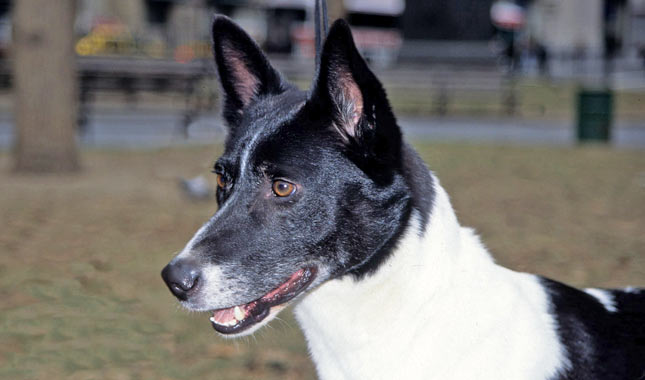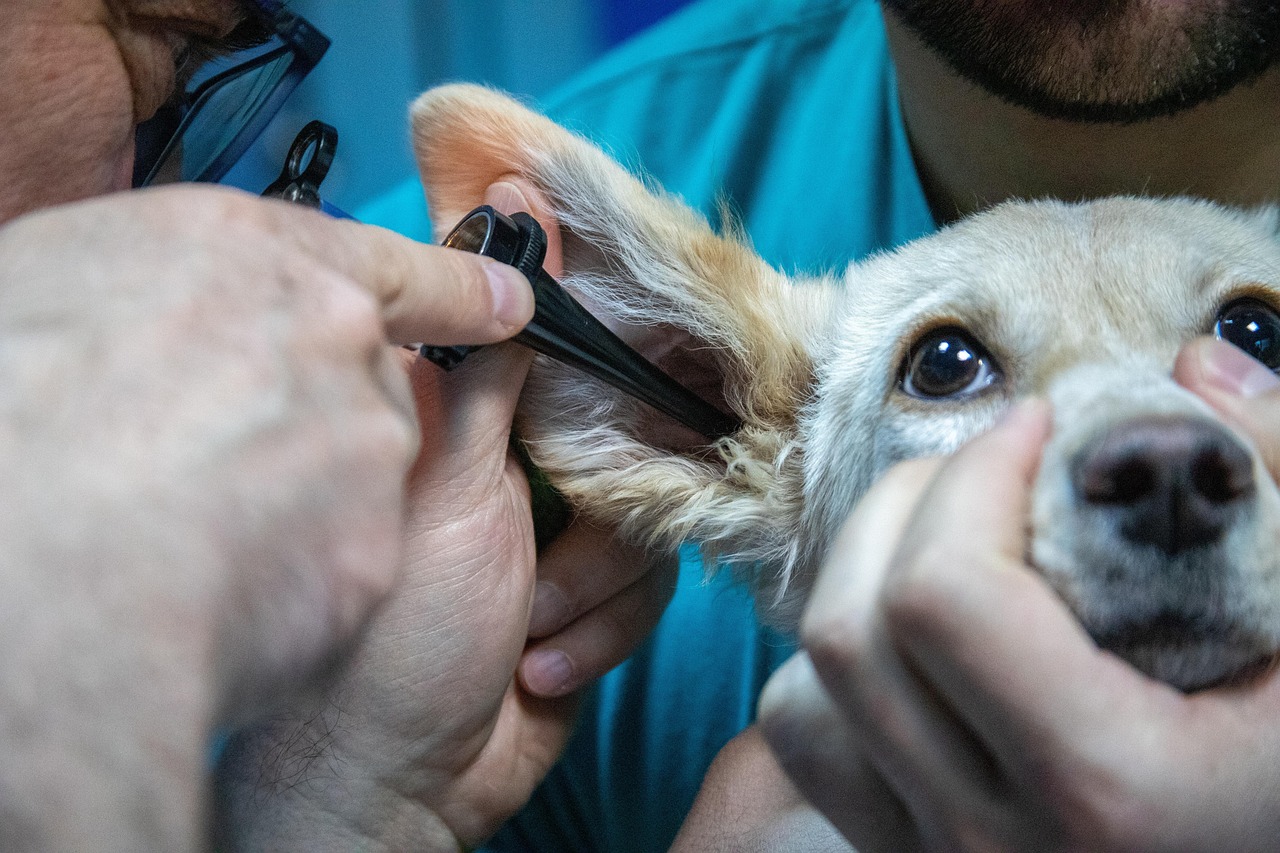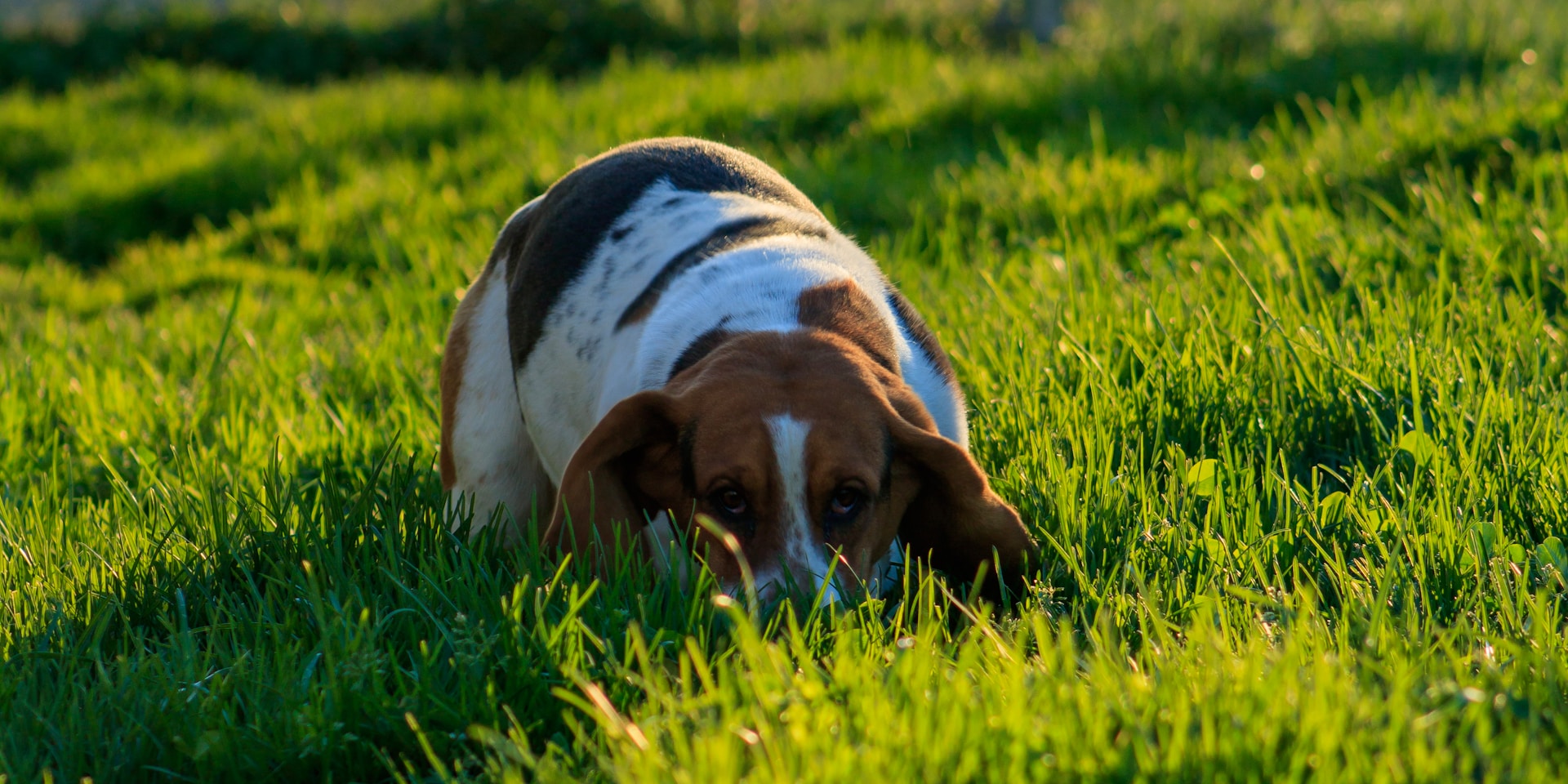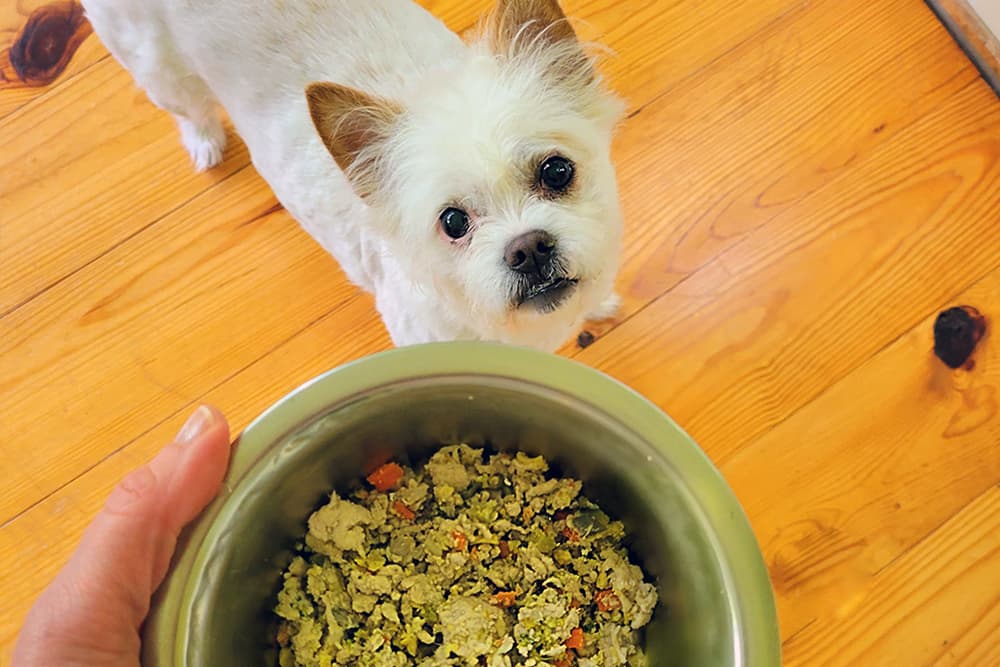Canaan Dog
Published on June 23, 2011
Breed Details
- Height: 19 to 24 inches at the shoulder
- Weight: 35 to 55 pounds
Breed Characteristics
Adaptability
Trainability
Grooming
Apartament Friendly
Child Friendly
Shedding Level
Dog Friendly
Exercise Needs
Territorial
Barking Tendencies
Health Issues
Social Needs
Energy Level
Affectionate
Watchdog Instincts
Cat Friendly
Intelligence
Stranger Friendly
This medium-size herding dog is an intelligent, independent thinker with natural watchdog instincts. He patrols his property and circles and barks at intruders, not permitting them to approach unless given the okay by his owner. The Canaan Dog is said to have originated in the biblical land of Canaan, where it was used to guard camps and flocks. After the Romans came and the nomadic population was dispersed, the dogs became feral, making their own way in the Negev Desert, finding work with Bedouin herdsmen or performing guard duty for the Druze people on Mount Carmel.
The dogs were redomesticated during World War II, proving to be intelligent and trainable sentry dogs, messengers and land mine detectors. After the war, they were trained to be guide dogs. Eventually, people became interested in them as companions. They have many excellent qualities, but being a still somewhat primitive breed, they have certain quirks that can make them difficult to live with unless they are placed with just the right people.
The Canaan Dog is generally not an indiscriminate barker, giving voice only when he thinks it’s necessary. However, if you have a lot of traffic to and from or in front of your house, your Canaan Dog will be barking a lot. Consider whether this will be a problem in your neighborhood.
The Canaan Dog is affectionate but not needy. He’ll check in with you occasionally, then go about his business of keeping an eye on things. He’s good with children, deeply loyal to his family and reserved with strangers. Socialize him early and often to ensure that he doesn’t become shy.
Canaan Dogs are highly trainable with positive reinforcement techniques, but like any dog, if you’re not consistent and firm with your commands, he will take advantage of you. He gets bored easily, so avoid repetition. Once you find out what motivates him, though, he’s an enthusiastic worker in whatever dog sport or activity you train him. Canaan Dogs can do well in almost any activity, including agility, obedience, rally and tracking. They are also found doing search and rescue and therapy dog work. And, of course, they are natural herders.
Because of his independent and adventurous spirit, the Canaan Dog is rarely reliable off leash. He has a superb sense of smell and excellent eyesight and is likely to take off if he senses something interesting.
The Canaan Dog has a short double coat that sheds heavily twice a year. During this time, he’ll need frequent brushing to remove dead hair. The rest of the year, brush the coat weekly to keep it clean. In addition, trim his nails as needed, brush his teeth, and keep his ears clean to prevent infections.
Last but not least, it should go without saying that a loyal and protective breed such as the Canaan Dog needs to live in the house. It’s an unhappy Canaan Dog who is relegated to the backyard with little or no human companionship.
Other Quick Facts
- The Canaan’s coat color can be mainly white with a mask and sometimes additional patches of color or a solid color ranging from black to all shades of brown, including sandy, red or liver, with or without white trim.
- Early Canaan Dogs used to deliver messages were good for only short distances. Because of their territorial nature, if a track was longer than 500 to 1,000 meters, they would simply turn around and go back to where they started.
- The Canaan Dog belongs to the AKC’s Herding Group, but outside North America he is considered to be a primitive spitz type.
The History of Canaan Dogs
In the Bible, the book of Exodus calls Canaan (ancient Palestine and Phoenicia from about 3,000 B.C.E.) a good and spacious land, flowing with milk and honey. Flocks of sheep and goats prospered there, and where there are flocks, there are dogs. The dogs that cared for the flocks of Canaan were known as Kelef Kanani, Hebrew words meaning Canaan Dog. Today’s Canaan Dog probably differs little from his ancient ancestor. Tomb drawings from Beni Hassan in Egypt, which date to 2200-2000 B.C.E., show dogs with smooth coats, prick ears and bushy tails curling over their backs. No doubt they had the same alert, watchful, inquisitive expression that marks today’s Canaan Dog, a breed that may well be a living portrait of early domesticated dogs.
Over the millennia, the Canaan Dog’s life changed. The Romans came, and the inhabitants of the land were scattered to the far corners of the earth. The dogs became unemployed and retreated to the hilly desert of what is now southern Israel, living a feral life that depended on their wits and fitness. Some traveled with Bedouin nomads, performing their historic job of herding and guarding flocks. Sculpted by their harsh lifestyle, they became wily athletes who were perfectly suited to their desert environment.
For centuries, the Canaan Dog continued his unfettered life in the desert, but in 1935, world events conspired to bring him back into the human community. Not only was World War II brewing, an independent Jewish state was in the making. Isolated Jewish settlements needed guard dogs that could withstand the harsh conditions, and the area’s armed forces were in need of a desert-tough guard and patrol dog. Rudolphina Menzel, a professor of animal and comparative psychology at the University of Tel Aviv, was asked to develop a dog that would meet those needs. She thought of the Canaan Dogs, with their finely honed survival skills.
It took her six months to capture the first one, but soon she acquired more and began a breeding program. By 1948, the Palestine Kennel Club had recognized the breed and registered 150 of the dogs. In addition to performing sentry work and land mine detection, the dogs were trained as guide dogs.
The first Canaan Dogs in the United States were imported in 1965 by Ursula Berkowitz of Oxnard, California. The same year, the Canaan Dog Club of America was formed. After overcoming many obstacles, the Canaan Dog was recognized by the United Kennel Club in 1992 and the American Kennel Club in 1997. He currently ranks 163rd among the breeds registered by the AKC.
Canaan Dog Temperament and Personality
Besides his good looks and graceful movement, the Canaan Dog is blessed with an endearing and responsive personality. Although his heritage as a desert survivor gives him a certain degree of independence, a Canaan Dog who has been properly socialized loves his family and is adaptable to many different living situations. Life in an apartment with several short daily walks is just as agreeable to him as living in a suburban home with three noisy kids. Although he is loyal and affectionate, he’s not a glutton for attention.
The Canaan Dog is active, but his energy level isn’t excessive. His territorial nature means he is unlikely to roam, but like any dog he should be protected from traffic and other dangers, including his own curiosity, by a fenced yard or some other enclosure.
Being territorial, the Canaan is a natural watchdog. He’s sure to bark whenever anyone approaches the door, settling back down once he’s sure you are aware of the situation. With strangers he is watchful and aloof but should never be shy or aggressive toward anyone.
When it comes to dog sports and other activities, the Canaan is versatile. He doesn’t excel in any one area, but he is smart and quick to learn anything you can teach him. He draws the line only at jumping into a cold lake to retrieve a bird or dummy. Canaans retain primitive herding skills, but their herding instinct is not as powerful as that of some of the other herding breeds.
To counter any tendencies toward aloofness and dog aggression, Canaans need plenty of early socialization as well as firm but loving handling. Because of his independent nature, first-time dog owners may find him a bit of a handful, but a confident attitude and the help of a good trainer who understands the breed can ease the way. They get bored doing the same thing over and over, so keep training sessions short and interesting.
Start training your puppy the day you bring him home. Even at eight weeks old, he is capable of soaking up everything you can teach him. Don’t wait until he is 6 months old to begin training or you will have a more headstrong dog to deal with. If possible, get him into puppy kindergarten class by the time he is 10 to 12 weeks old, and socialize, socialize, socialize. However, be aware that many puppy training classes require certain vaccines (like kennel cough) to be up to date, and many veterinarians recommend limited exposure to other dogs and public places until puppy vaccines (including rabies, distemper and parvovirus) have been completed. In lieu of formal training, you can begin training your puppy at home and socializing him among family and friends until puppy vaccines are completed.
Talk to the breeder, describe exactly what you’re looking for in a dog, and ask for assistance in selecting a puppy. Breeders see the puppies daily and can make uncannily accurate recommendations once they know something about your lifestyle and personality. Whatever you want from a Canaan, look for one whose parents have nice personalities and who has been well socialized from early puppyhood.
What You Need to Know About Canaan Dog Health
All dogs have the potential to develop genetic health problems, just as all people have the potential to inherit a particular disease. Run, don’t walk, from any breeder who does not offer a health guarantee on puppies, who tells you that the breed is 100 percent healthy and has no known problems, or who tells you that her puppies are isolated from the main part of the household for health reasons. A reputable breeder will be honest and open about health problems in the breed and the incidence with which they occur in her lines.
That said, Canaan Dogs are a pretty healthy breed in general. Health problems are rare, but conditions that have been seen in individual Canaan Dogs include epilepsy and hypothyroidism.
Not all of these conditions are detectable in a growing puppy, and it is impossible to predict whether an animal will be free of these maladies, which is why you must find a reputable breeder who is committed to breeding the healthiest animals possible. They should be able to produce independent certification that the parents of the dog (and grandparents, etc.) have been screened for common defects and deemed healthy for breeding. That’s where health registries come in.
To help protect the breed’s good health, the Canaan Dog Club of America participates in the Canine Health Information Center, a health database. Before individual Canaan Dogs can be issued a CHIC number, breeders must submit hip, elbow and patella evaluations from the Orthopedic Foundation for Animals (OFA), an OFA thyroid evaluation, and eye test results from the Canine Eye Registration Foundation (CERF). PennHIP certification of hips is also accepted.
Breeders must agree to have all test results, positive or negative, published in the CHIC database. A dog need not receive good or even passing scores on the evaluations to obtain a CHIC number, so CHIC registration alone is not proof of soundness or absence of disease, but all test results are posted on the CHIC website and can be accessed by anyone who wants to check the health of a puppy’s parents. If the breeder tells you she doesn’t need to do those tests because she’s never had problems in her lines and her dogs have been “vet checked,” then you should go find a breeder who is more rigorous about genetic testing.
Careful breeders screen their breeding dogs for genetic disease and breed only the healthiest and best-looking specimens, but sometimes Mother Nature has other ideas and a puppy develops one of these diseases despite good breeding practices. Advances in veterinary medicine mean that in most cases the dogs can still live a good life. If you’re getting a puppy, ask the breeder about the ages of the dogs in her lines and what they died of.
Remember that after you’ve taken a new puppy into your home, you have the power to protect him from one of the most common health problems: obesity. Keeping a Canaan Dog at an appropriate weight is one of the easiest ways to extend his life. Make the most of your preventive abilities to help ensure a healthier dog for life.
The Basics of Canaan Dog Grooming
If you want a medium-size dog with an easy-care coat, the Canaan is one to consider. He has a double coat, but little brushing is required to keep it in good condition. Give it a weekly going over with a rubber curry brush or hound mitt to remove dead hair and distribute skin oils.
Shedding is minimal during most of the year. Twice a year, the Canaan undergoes a heavier shed, and more frequent brushing is necessary during that time. Bathe him only as needed.
The rest is basic care. Trim the nails every few weeks. Brush the teeth for good overall health and fresh breath.
Finding a Canaan Dog
Whether you want to go with a breeder or get your dog from a shelter or rescue, here are some things to keep in mind.
Choosing a Canaan Dog Breeder
Finding a good breeder is the key to finding the right puppy. A good breeder will match you with the right puppy, and will without question have done all the health certifications necessary to screen out health problems as much as is possible. He or she is more interested in placing pups in the right homes than in making big bucks.
Good breeders will welcome your questions about temperament, health clearances and what the dogs are like to live with and come right back at you with questions of their own about what you’re looking for in a dog and what kind of life you can provide for him. A good breeder can tell you about the history of the breed, explain why one puppy is considered pet quality while another is not, and discuss what health problems affect the breed and the steps she takes take to avoid those problems. A breeder should want to be a resource for you throughout your dog’s life.
Look for more information about the Canaan and start your search for a good breeder at the website of the Canaan Dog Club of America (AKC) and the Israel Canaan Dog Club of America (UKC). Choose a breeder who has agreed to abide by the CDCA’s code of ethics, which prohibits the sale of puppies to or through pet stores and requires breeders to obtain recommended health clearances on dogs before breeding them.
Avoid breeders who only seem interested in how quickly they can unload a puppy on you and whether your credit card will go through. Breeders who offer puppies at one price “with papers” and at a lower price “without papers” are unethical and should be reported to the CDCA, the ICDCA, the United Kennel Club and the American Kennel Club. You should also bear in mind that buying a puppy from websites that offer to ship your dog to you immediately can be a risky venture, as it leaves you no recourse if what you get isn’t exactly what you expected. Put at least as much effort into researching your puppy as you would into choosing a new car or expensive appliance. It will save you money in the long run.
Many reputable breeders have websites, so how can you tell who’s good and who’s not? Red flags include puppies always being available, multiple litters on the premises, having your choice of any puppy, and the ability to pay online with a credit card. Those things are convenient, but they are almost never associated with reputable breeders.
Whether you’re planning to get your new best friend from a breeder, a pet store, or another source, don’t forget that old adage “let the buyer beware”. Disreputable breeders and facilities that deal with puppy mills can be hard to distinguish from reliable operations. There’s no 100% guaranteed way to make sure you’ll never purchase a sick puppy, but researching the breed (so you know what to expect), checking out the facility (to identify unhealthy conditions or sick animals), and asking the right questions can reduce the chances of heading into a disastrous situation. And don’t forget to ask your veterinarian, who can often refer you to a reputable breeder, breed rescue organization, or other reliable source for healthy puppies.
Before you decide to buy a puppy, consider whether an adult Canaan Dog might better suit your needs and lifestyle. Puppies are loads of fun, but they require a lot of time and effort before they grow up to become the dog of your dreams. An adult may already have some training and will probably be less active, destructive and demanding than a puppy. With an adult, you know more about what you’re getting in terms of personality and health and you can find adults through breeders or shelters. If you are interested in acquiring an older dog through breeders, ask them about purchasing a retired show dog or if they know of an adult dog who needs a new home. If you want to adopt a dog, read the advice below on how to do that.
Adopting a Dog From a Canaan Dog Rescue or Shelter
There are many great options available if you want to adopt a dog from an animal shelter or breed rescue organization. Here is how to get started.
Use the Web
Sites like Petfinder.com and Adopt-a-Pet.com can have you searching for a Canaan Dog in your area in no time flat. The site allows you to be very specific in your requests (housetraining status, for example) or very general (all the Canaan Dogs available on Petfinder across the country). AnimalShelter.org can help you find animal rescue groups in your area. Also some local newspapers have “pets looking for homes” sections you can review.
Social media is another great way to find a dog. Post on your Facebook page that you are looking for a specific breed so that your entire community can be your eyes and ears.
Reach Out to Local Experts
Start talking with all the pet pros in your area about your desire for a Canaan Dog. That includes vets, dog walkers, and groomers. When someone has to make the tough decision to give up a dog, that person will often ask her own trusted network for recommendations.
Talk to Breed Rescue
Networking can help you find a dog that may be the perfect companion for your family. Most people who love Canaan Dogs love all Canaan Dogs. That’s why breed clubs have rescue organizations devoted to taking care of homeless dogs. The Canaan Dog Club of America’s rescue network can help you find a dog that may be the perfect companion for your family. You can also search online for other Canaan Dog rescues in your area.
The great thing about breed rescue groups is that they tend to be very upfront about any health conditions the dogs may have and are a valuable resource for advice. They also often offer fostering opportunities so, with training, you could bring a Canaan home with you to see what the experience is like.
Key Questions to Ask
You now know the things to discuss with a breeder, but there are also questions you should discuss with shelter or rescue group staff or volunteers before you bring home a pup. These include:
- What is his energy level?
- How is he around other animals?
- How does he respond to shelter workers, visitors and children?
- What is his personality like?
- What is his age?
- Is he housetrained?
- Has he ever bitten or hurt anyone that they know of?
- Are there any known health issues?
Wherever you acquire your Canaan Dog, make sure you have a good contract with the seller, shelter or rescue group that spells out responsibilities on both sides.
Puppy or adult, take your Canaan to your veterinarian soon after adoption. Your veterinarian will be able to spot problems, and will work with you to set up a preventive regimen that will help you avoid many health issues.










